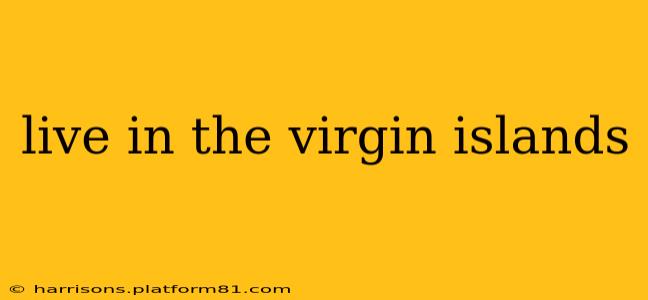Living in the Virgin Islands: Paradise Found? A Comprehensive Guide
The Virgin Islands, a stunning archipelago in the Caribbean, evokes images of pristine beaches, turquoise waters, and a laid-back lifestyle. But what's it really like to live there? This comprehensive guide delves into the realities of life in this idyllic paradise, exploring the pros, cons, and everything in between. Whether you're dreaming of a tropical relocation or simply curious about island life, this article offers valuable insights.
What is the cost of living in the Virgin Islands?
The cost of living in the Virgin Islands is significantly higher than the U.S. mainland average. This is primarily due to the high import costs of goods, limited local production, and the overall demand in this popular tourist destination. Expect to pay more for groceries, housing, utilities, transportation, and healthcare. While salaries in certain sectors might be competitive, the overall expense can be a substantial adjustment for newcomers. Budgeting meticulously and researching specific island costs is crucial before making the move.
What are the best islands to live on in the Virgin Islands?
The U.S. Virgin Islands (USVI) comprise three main islands – St. Thomas, St. Croix, and St. John – each offering a unique lifestyle. St. Thomas is the most bustling, boasting a vibrant city life and extensive tourism infrastructure. St. Croix, the largest island, offers a more laid-back atmosphere with a blend of historical charm and natural beauty. St. John, a protected national park, provides a secluded and nature-focused experience, ideal for those seeking tranquility. The best island for you will depend on your personal preferences and priorities – whether you prefer a bustling city, a quiet town, or a secluded escape. British Virgin Islands (BVI) also offers similar considerations, with Tortola being the largest and most developed.
What is the job market like in the Virgin Islands?
The job market in the Virgin Islands is heavily reliant on tourism, which significantly impacts seasonal employment fluctuations. Opportunities exist in hospitality, retail, marine industries, and government sectors. However, competition can be fierce, and finding employment that matches your skills and experience might require proactive networking and a flexible approach. Entrepreneurship is also a viable option, though requires careful planning and understanding of local regulations.
Is it easy to get a job in the Virgin Islands?
Securing a job in the Virgin Islands isn't always easy. The competition for available positions can be intense, particularly in the tourism sector. Applicants often need to demonstrate relevant experience, possess strong local connections, and be prepared for a potentially competitive job market. Having a specialized skill set or entrepreneurial spirit can increase your chances of finding successful employment.
What are the pros and cons of living in the Virgin Islands?
Pros:
- Stunning natural beauty: Crystal-clear waters, pristine beaches, and lush landscapes create a breathtaking backdrop to daily life.
- Relaxed lifestyle: A slower pace of life, prioritizing outdoor activities and social connections.
- Tax benefits (USVI): Depending on your residency status, tax advantages might apply. However, it is imperative to research these thoroughly as regulations can be complex.
- Warm weather year-round: Enjoy consistent sunshine and tropical temperatures.
Cons:
- High cost of living: As mentioned earlier, living expenses are significantly higher than mainland U.S. averages.
- Hurricane season: The islands are susceptible to hurricanes, requiring preparation and awareness.
- Limited job opportunities: The job market is relatively small and competitive.
- Isolation: The remoteness of the islands can lead to feelings of isolation for some.
What is the culture like in the Virgin Islands?
The Virgin Islands boasts a rich and diverse culture, reflecting its history as a melting pot of various influences – Caribbean, African, European, and American. A vibrant mix of traditions, music, cuisine, and languages creates a unique island identity. The pace of life is generally relaxed, with a strong emphasis on community and social interactions.
What is the best time to visit the Virgin Islands?
The best time to visit the Virgin Islands is during the shoulder seasons (April-May and September-October), offering pleasant weather and fewer crowds than peak season. However, hurricane season (June-November) presents a risk, requiring careful consideration and preparation.
This guide provides a starting point for understanding life in the Virgin Islands. It's crucial to conduct thorough research, visit the islands, and connect with locals before making a significant life change. The allure of island life is strong, but careful consideration of all factors is essential for a successful and fulfilling experience.
